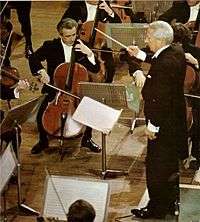
Cockaigne
Cockaigne or Cockayne /kɒˈkeɪn/ is a land of plenty in medieval myth, an imaginary place of extreme luxury and ease where physical comforts and pleasures are always immediately at hand and where the harshness of medieval peasant life does not exist. Specifically, in poems like The Land of Cockaigne, Cockaigne is a land of contraries, where all the restrictions of society are defied (abbots beaten by their monks), sexual liberty is open (nuns flipped over to show their bottoms), and food is plentiful (skies that rain cheeses). Writing about Cockaigne was a commonplace of Goliard verse. It represented both wish fulfillment and resentment at the strictures of asceticism and death.
Etymology
While the first recorded use of the name are the Latin "Cucaniensis", and the Middle English "Cokaygne", or modern-day "Cuckoo-land", one line of reasoning has the name tracing to Middle French (pays de) cocaigne "(land of) plenty," ultimately adapted or derived from a word for a small sweet cake sold to children at a fair (OED). In Italian, the same place is called "Paese della Cuccagna"; the Flemish-Belgian equivalent is "Luilekkerland" ("relaxed luscious, delicious land"), translated from the Middle-Belgian word "Cockaengen", and the German equivalent is Schlaraffenland (also known as "land of milk and honey"). In Spain an equivalent place is named Jauja, after a rich mining region of the Andes, and País de Cucaña ("fools' paradise") may also signify such a place. From Swedish dialect lubber (fat lazy fellow) comes Lubberland, popularized in the ballad An Invitation to Lubberland.

Cockaigne (In London Town)
Cockaigne (In London Town), Op. 40, also known as the Cockaigne Overture, is a concert overture for full orchestra composed by the British composer Edward Elgar in 1900-01.
History
At the beginning of the twentieth century the success of the Enigma Variations had been followed by the initial failure of The Dream of Gerontius, which caused Elgar to be dispirited and declare that God was against art. Nevertheless, on receiving a commission from the Royal Philharmonic Society he began work on the new piece and soon reported that it was 'cheerful and Londony, "stout and steaky"' ... 'honest, healthy, humorous and strong, but not vulgar'.
The first performance was in the Queen's Hall, London at a Royal Philharmonic Society Concert, on 20 June 1901, conducted by the composer. The work was dedicated to the composer's 'many friends, the members of British orchestras'. The music was an immediate success and became one of Elgar's most popular works. It has been performed in the concert hall less frequently in recent decades, though a performance conducted by Britain's then Prime Minister, Edward Heath, at a gala London Symphony Orchestra concert at the Festival Hall in November 1971, pictured, brought Cockaigne to much wider attention than usual.
Podcasts:

